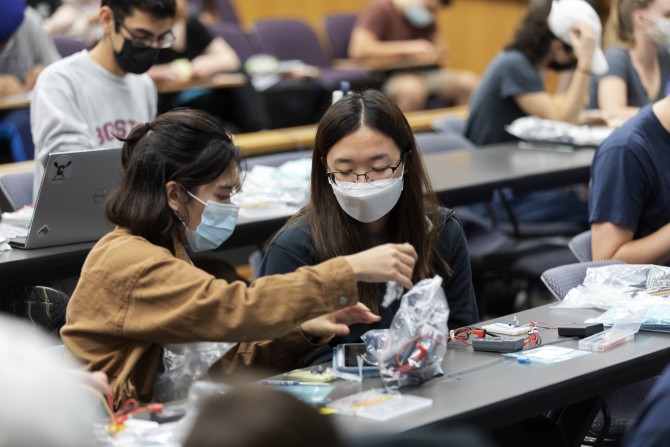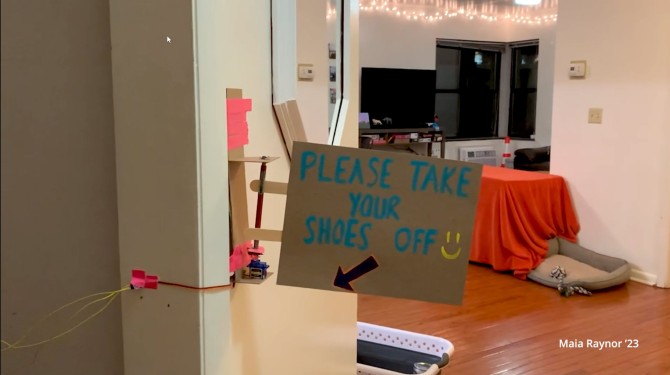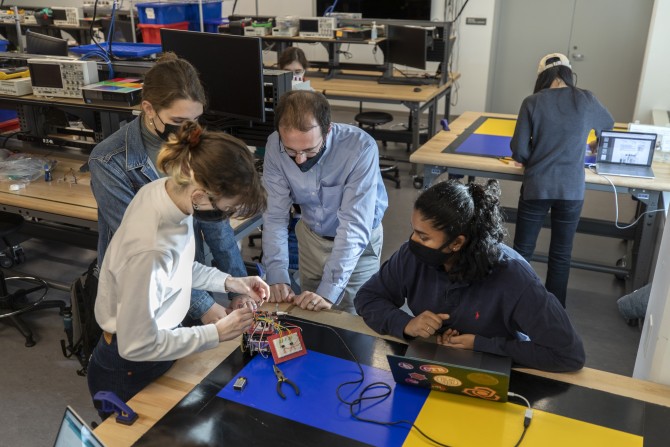News directly from Cornell's colleges and centers
Innovative projects prepare students for ‘real’ engineering
By Dave Winterstein
At the crossroads between mechanical and electrical engineering, Mechatronics (MAE 3780) explores the technologies used in appliances that surround our everyday life. The course’s innovative approach actively engages students in considering and using concepts essential to many engineering specializations.
The course is part of a project funded by the Active Learning Initiative to transform courses taken by most students in the Sibley School of Mechanical and Aerospace Engineering to provide a richer, more applied learning experience.
Benjamin M. Finio, lecturer in the Sibley School in the College of Engineering, starts by giving students a specially designed circuit kit. Students use the kit in lecture activities and on assignments. The kits help students connect theoretical knowledge with hands-on skills using hardware that interacts with the physical world. Students also use the kit for an open-ended individual project that solves a real-world problem.
The pandemic’s influence led many of the solutions students created, such as a doorknob disinfecting device. Others reflected the return to communal living with what Finio called “passive aggressive roommate projects,” such as a sign reminding people to take off their shoes in the apartment.
Through this assignment, students learn that unlike on an exam, there often is no single correct answer to engineering problems.
“Students might feel a little uncomfortable and take a minute to find their footing [with an open-ended project],” said Finio, “but this is what real engineering is all about.”
However, Finio said the projects are also the most exciting part of the class for students; they look forward to the creative thinking process.
“We have a lot of authority over the projects, which is really helpful for learning,” said Sunaya Reddy ’23.
Also, Finio said understanding how to use the components in the kits boosts their confidence in their ability to build the types of systems and appliances around us in today’s world. Now, when they see an automatic door open, they can begin to think about how it operates.
Lastly, having students use the kits on individual projects helps develop the full range of skills they will need for their second project.
Because the second project is a group assignment, Finio found that groups often assigned tasks based on the skills members already brought to the group. Students more skilled with hardware might not work on programming, focusing on their strengths rather than developing a well-rounded skill set.
Finio’s second assignment is a robot competition. Student groups build robots, which then compete in a public event at the end of the semester.
This year’s event took place on December 7 and required students’ robots to compete against an opponent to collect a set of blocks within the operating area. Robots had to navigate the space, gather the blocks, and contend with the opposing robot.
In the competition, student designs must interact in a real-world setting rather than the controlled lab environment. The process of working together to build a robot that functions in the real world is Finio’s true learning outcome.
“What I like about this project is that we all help each other,” said Emily Harmon ’23.
Reddy, who worked on the project with Harmon and Molly Drumm ’23, agreed, saying that regardless of the competition, “Getting it to work is our primary goal.”
This project was funded by a gift from Alex Hanson ‘87 and Laura Hanson ‘87. The Active Learning Initiative, developed within the College of Arts and Sciences with help from the Hansons, is supported by Cornell's Office of the Vice Provost for Academic Innovation and the Center for Teaching Innovation.
Chip-machine manufacturer ASML provided corporate support for the course as well.
Dave Winterstein is a communication specialist at the Center for Teaching Innovation.
Media Contact
Get Cornell news delivered right to your inbox.
Subscribe



